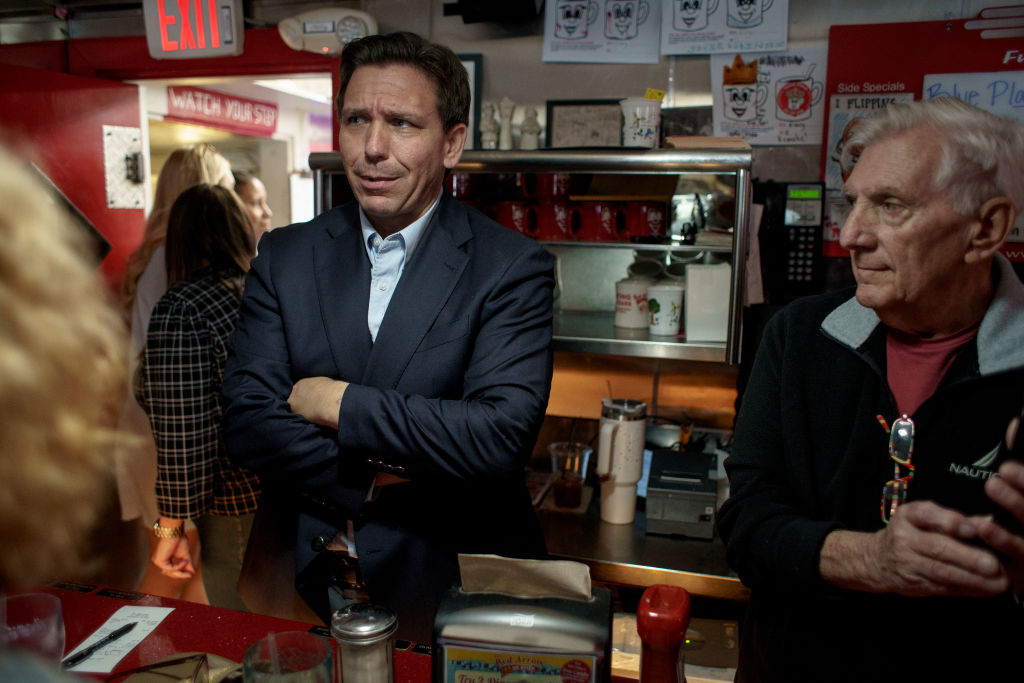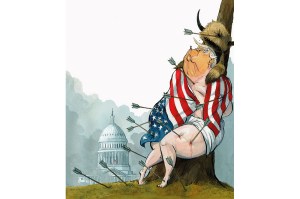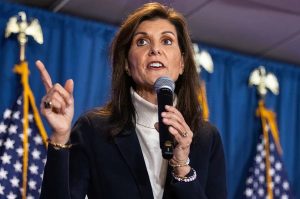Is Ron DeSantis’s decision to launch his presidential bid on a Twitter hangout with Elon Musk this evening evidence of a fatally online campaign or a smart if risky way to inject some juice into a candidacy that some have written off as dead on arrival?
The only honest answer to that question is that we’ll soon find out. My own two cents: a more traditional launch is something of a non-event anyway — an undercooked stump speech, a carefully selected cross section of the population waving banners in the background. There’ll be plenty of those over the coming months, so why not try something different?
DeSantis’s Twitter launch isn’t just a moment worth paying attention to for its electoral consequences. It’s also the latest example of the increasingly blurred lines between politics, media, tech and entertainment. Those lines have never been perfectly neat, but they get harder to spot by the day. Part of the reason is technological: the internet destroying distinctions between different public figures’ roles because all that matters is what they churn out online. Part of it is political dysfunction: there’s nothing inevitable about a cable news host speaking at a Trump rally, or a White House press secretary stepping down and walking straight into a lucrative and influential cable news anchor role.
Elon Musk is taking on old-school media barons by pitching Twitter as the spiritual home of free expression — and he has a chance of succeeding because the distinctions between a social media network and a cable news channel matter a lot less than they used to. That Ron DeSantis can even contemplate launching his populist pitch for the presidency by chatting to a billionaire tech plutocrat is further evidence of the flattening caused by technology and tribal politics. In the eyes of many, Musk is no longer primarily an entrepreneur good at building rockets, electric cars and online payment systems. He’s a participant in the comic-book movie that is American public life. If you write for Vanity Fair, you think he’s a baddie, hence why we are served headlines like: “Ron DeSantis will formally announce his 2024 bid with Elon Musk, because apparently David Duke wasn’t available.” It’s also why the Atlantic’s Charlie Warzel feels comfortable asserting that “Twitter is a far-right social network.” It’s team sports, and Musk is on the wrong side. On the other side of the divide, DeSantis/Musk is an exciting collaboration between two of their favorite brands.
(Lost in all of this are Musk’s fairly middle of the road political views. Park his tech-bro sci-fi preoccupations and you are left with a swing voter with libertarian impulses and a dislike of wokeness who opted for Biden last time around.)
This flattening, though, is mostly a flattening in perception. Governors still have to run a state executive. Senators have bills they have to vote on. And tech entrepreneurs have businesses to run. And when it comes to tech and politics, 2024 is shaping up to be far more complicated than 2020.
In a sharp piece for Tablet earlier this month, Nadia Asparouhova identified the division of Silicon Valley into two powerful cliques with very different views of the world. It’s not quite left versus right but elitist versus anti-elite. On one side are establishment figures like Bill Gates, George Soros and (somewhat reluctantly) Mark Zuckerberg. On the other are a more puckish, troublemaking set that includes Musk as well as Marc Andreessen and Peter Thiel. “In the cafeteria of America’s billionaires, Andreessen and his peers are hurling food and spoiling for a fight, while the incumbents are calling in favors at the State Department and New York Times,” writes Asparouhova.
In the last election, the tech world mostly deferred to the powers that be, content to play teachers pet and avoid too much trouble with the regulators. That remains true of much of Silicon Valley. But it doesn’t look like things will be quite as monolithic this time around. And the most prominent example of that is Musk, who is set to play an influential role in 2024 — starting now.
On our radar
DEBT CEILING LATEST House Minority Leader Hakeem Jeffries struck a downbeat tone talking to reporters about the debt ceiling negotiations today. “It’s increasingly clear to me that House Republicans are intent on crashing the economy and defaulting on our debt,” he said. Kevin McCarthy acknowledged that the two sides remain “far apart” but said negotiations might “finish up” tonight.
SEND FOR OPRAH! California Democrats fight over Dianne Feinstein’s refusal to retire and what might happen next only gets more intriguing. Last week we had the revelation that Nancy Pelosi’s eldest daughter is chaperoning Feinstein around the Hill, with some suggesting this was more about politics than elderly care. This week we have Oprah Winfrey being raised as a possible stop-gap senator who could Gavin Newsom could appoint to do the job until the next election.
*** Sign up to receive the DC Diary in your inbox here ***
Poet laureate can’t define a ‘ban’
Amanda Gorman, the young female poet who read at Joe Biden’s inauguration lamented on Tuesday night that her poem had been banned by a Florida school library.
“Just found out my inaugural poem ‘The Hill We Climb’ has been banned from an elementary school in Miami-Dade County because it causes “confusion and indoctrination,” America’s first National Youth Poet Laureate tweeted.
The poem, however, was never banned. Instead, according to the Miami-Dade school district, “The Hill We Climb” was moved from the elementary section of the library to the middle-school section.
“It was determined at the school that ‘The Hill We Climb’ is better suited for middle-school students and, it was shelved in the middle-school section of the media center. The book remains available in the media center,” a statement from the school district said.
The school moved the book of poetry after a parent of two students complained that it was not “educational” and contained indirect “hate messages.” In the complaint, the parent mistook Oprah Winfrey as the poem’s author.
Naturally, the media responded to Gorman’s “ban” claim by checking how true it was before regurgitating it… just kidding! The Miami Herald first reported Gorman’s post and it was quickly rewritten by other outlets who decried the ban as an assault on free speech. A selection of headlines includes the Guardian’s “Amanda Gorman ‘gutted’ after Florida school bans Biden inauguration poem”; MSNBC’s “Florida school bans Amanda Gorman poem over one parent’s CRT fears”; and USA Today’s “Florida school bans elementary students from reading Amanda Gorman’s ‘The Hill We Climb’ poem”
After criticism over calling the schools decision a ban, Gorman took to Twitter again to double-down on her claim.
“A school book ban is any action taken against a book that leaves access to a book restricted or diminished,” she tweeted. “This decision of moving my book from its original place, taken after one parent complained, diminishes the access elementary schoolers would have previously had to my poem.”
Cockburn hopes that, in the future, America’s favorite wordsmith can find the proper words to express her victimization.
Why DeSantis should talk about Jeffrey Epstein tonight
DeSantis’s choice to enter the presidential stakes with a Twitter Spaces conversation is unusual. Odder still is the news that he will do so in an interview conducted by Elon Musk, and a discussion moderated by David Sacks. There are so many questions here: the most obvious being, “why did you choose to roll out with a pair of wealthy tech investors from the PayPal Mafia, known as much for their accomplishments as for their eccentricities?” But here is also the question about the questions: what will DeSantis be asked?
One question that might come up given the Very Online nature of this interview concerns one figure whose connections to the billionaire and political class have proven so embarrassing for those in power: Jeffrey Epstein. The late sex offender and shadowy finance figure has been back in the headlines of late thanks to reporting from the Wall Street Journal, which unveiled new information obtained from previously unreported calendars and communications. These include a potential blackmail of Bill Gates over his relationship with a young Russian bridge player — an indication of the degree to which so much about Epstein’s activities remains a mystery.
In response to the Journal’s reporting, presidential candidate Vivek Ramaswamy has already announced that if elected, he would release “the full Epstein client list,” writing on Twitter: “The administrative-police state should stop protecting its chief sponsors while weaponizing itself against its opponents. The first step to fix corruption is to see it.”
DeSantis has interacted with this story before, beginning in 2019 when he announced a state attorney investigation into Epstein’s Florida plea deal over allegations that he had gotten a slap on the wrist from then-prosecutor Alex Acosta, who later served as Donald Trump’s labor secretary before being forced to resign. The Florida investigation, along with others, ultimately found no criminal wrongdoing, leaving many of Epstein’s victims unsatisfied and prompting new conspiracy theories about why Epstein had been treated so leniently.
There’s an opportunity here for DeSantis to take a stand that would potentially send ripples through the Twitter audience, even if it isn’t something that will be front of mind for many voters: commit that as president, he would release any and all information about Epstein — not just the client list, but what the government knows about his connections and relationships with the powerful. Taking such a stand would do more than just ruffle feathers — it would demonstrate how much DeSantis is an outsider committed to draining the swamp, and not someone beholden to the jet-set elites. Americans deserve to know the truth..
From the site
Ben Domenech: They wanted to break the internet. It broke them
Freddy Gray: Will DeSantis spare America from a Biden-Trump rematch?
Christopher Sandford: The Seattle mayor’s CHOP cover-up


















